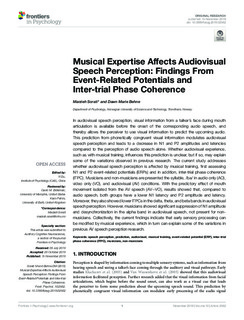Musical Expertise Affects Audiovisual Speech Perception: Findings From Event-Related Potentials and Inter-trial Phase Coherence
| dc.contributor.author | Sorati, Marzieh | |
| dc.contributor.author | Behne, Dawn Marie | |
| dc.date.accessioned | 2020-01-16T07:26:58Z | |
| dc.date.available | 2020-01-16T07:26:58Z | |
| dc.date.created | 2019-11-16T00:08:29Z | |
| dc.date.issued | 2019 | |
| dc.identifier.citation | Frontiers in Psychology. 2019, . | nb_NO |
| dc.identifier.issn | 1664-1078 | |
| dc.identifier.uri | http://hdl.handle.net/11250/2636533 | |
| dc.description.abstract | In audiovisual speech perception, visual information from a talker’s face during mouth articulation is available before the onset of the corresponding audio speech, and thereby allows the perceiver to use visual information to predict the upcoming audio. This prediction from phonetically congruent visual information modulates audiovisual speech perception and leads to a decrease in N1 and P2 amplitudes and latencies compared to the perception of audio speech alone. Whether audiovisual experience, such as with musical training, influences this prediction is unclear, but if so, may explain some of the variations observed in previous research. The current study addresses whether audiovisual speech perception is affected by musical training, first assessing N1 and P2 event-related potentials (ERPs) and in addition, inter-trial phase coherence (ITPC). Musicians and non-musicians are presented the syllable, /ba/ in audio only (AO), video only (VO), and audiovisual (AV) conditions. With the predictory effect of mouth movement isolated from the AV speech (AV−VO), results showed that, compared to audio speech, both groups have a lower N1 latency and P2 amplitude and latency. Moreover, they also showed lower ITPCs in the delta, theta, and beta bands in audiovisual speech perception. However, musicians showed significant suppression of N1 amplitude and desynchronization in the alpha band in audiovisual speech, not present for nonmusicians. Collectively, the current findings indicate that early sensory processing can be modified by musical experience, which in turn can explain some of the variations in previous AV speech perception research. | nb_NO |
| dc.language.iso | eng | nb_NO |
| dc.publisher | Frontiers Media | nb_NO |
| dc.relation.uri | https://www.frontiersin.org/articles/10.3389/fpsyg.2019.02562/full | |
| dc.rights | Navngivelse 4.0 Internasjonal | * |
| dc.rights.uri | http://creativecommons.org/licenses/by/4.0/deed.no | * |
| dc.title | Musical Expertise Affects Audiovisual Speech Perception: Findings From Event-Related Potentials and Inter-trial Phase Coherence | nb_NO |
| dc.type | Journal article | nb_NO |
| dc.type | Peer reviewed | nb_NO |
| dc.description.version | publishedVersion | nb_NO |
| dc.source.pagenumber | 19 | nb_NO |
| dc.source.journal | Frontiers in Psychology | nb_NO |
| dc.identifier.doi | 10.3389/fpsyg.2019.02562 | |
| dc.identifier.cristin | 1748249 | |
| dc.description.localcode | Copyright © 2019 Sorati and Behne. This is an open-access article distributed under the terms of the Creative Commons Attribution License (CC BY). The use, distribution or reproduction in other forums is permitted, provided the original author(s) and the copyright owner(s) are credited and that the original publication in this journal is cited, in accordance with accepted academic practice. No use, distribution or reproduction is permitted which does not comply with these terms. | nb_NO |
| cristin.unitcode | 194,67,40,0 | |
| cristin.unitname | Institutt for psykologi | |
| cristin.ispublished | true | |
| cristin.fulltext | original | |
| cristin.qualitycode | 2 |
Tilhørende fil(er)
Denne innførselen finnes i følgende samling(er)
-
Institutt for psykologi [2883]
-
Publikasjoner fra CRIStin - NTNU [37177]

